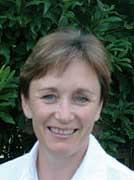This year's winner of the Nyholm Prize for Education is Professor Tina Overton of the University of Hull

Tina Overton receives her award and £5000 for 'her leadership and initiative in developing areas of chemistry education'. This biennial award was founded in 1973 in commemoration of Sir Ronald Nyholm, president of the RSC from 1968-70 and one of the founders of chemical education research. As part of her award Overton will give a Nyholm lecturer tour of the UK.
From parrots to professionals
The theme of Overton's Nyholm lecture, From parrots to professionals: producing effective chemistry graduates, reflects her strong belief of what teaching and learning of chemistry in HE should deliver. 'The goal of today's HE chemistry teacher should be to develop undergraduates' transferable skills through the context of chemistry so that they graduate as independent, motivated, life-long learners', she says. 'We should be producing graduates that operate as effective professionals. To do this students need more than an encyclopedic knowledge of chemistry, they need skills to work in a team, communicate effectively and solve unfamiliar problems'.
Overton's contributions to chemical education research are geared towards achieving this goal. She joined Hull in 1992, bringing with her part-time HNC and BSc chemistry programmes (and the students) she previously taught at Humberside Polytechnic. At Hull Overton has introduced a more active model of teaching chemistry, which involves problem-based learning activities that enhance students' understanding of chemistry and develop transferable skills such as critical thinking.
With her experiences of teaching part-time students and of studying part-time for a professional chemistry qualification while working in industrial analytical labs, Overton has developed course material to engage full-time undergraduates with the broader issues professional chemists face by setting chemical problems in real contexts.
She has recently updated one of the earliest problem-based learning activities she developed for a module on industrial chemistry to reflect the global nature of the chemical industry. 'Students take on the role of chemists based in the UK working for a company that has bought a titanium oxide pigment manufacturing plant in India', she explains. 'Working in small groups, they evaluate information on the plant, consider the chemistry and other broader issues, such as safety, economics, environmental impact etc, and put forward recommendations on the future of the site in written reports, posters and oral presentations'.
Overton also plays a leading role in promoting the work of others and supporting the continuing professional development of HE chemistry teachers. In the 1990s, working with previous Nyholm winner John Garratt, Overton set up the annual Variety in Chemistry Education Conference, which she continues to run.
Since 2000 Overton has been seconded part-time as director of the Higher Education Academy (HEA) Physical Sciences Centre. 'The centre provides a hub through which HE physical science teachers can disseminate good practice effectively, contribute to resources and meetings to support continuing professional development, and source funding to support their chemical education research'.
According to Overton, studies such as the recent HEA Physical Sciences Centre review of the undergraduate learning experience in chemistry, which is published this month, show that the success of the centre and other initiatives, such as the RSC-led Chemistry for our future project, is having a positive impact on the teaching and learning of chemistry in HE. 'Across a range of institutions we are starting to see a move towards teaching and learning approaches that engage students in chemistry and develop their professional skills'.







No comments yet